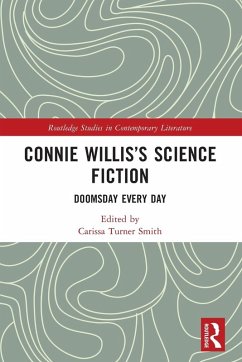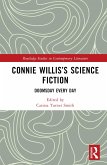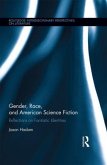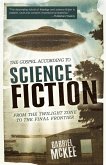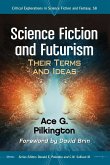Connie Willis's Science Fiction
Doomsday Every Day
Herausgeber: Turner Smith, Carissa
Connie Willis's Science Fiction
Doomsday Every Day
Herausgeber: Turner Smith, Carissa
- Broschiertes Buch
- Merkliste
- Auf die Merkliste
- Bewerten Bewerten
- Teilen
- Produkt teilen
- Produkterinnerung
- Produkterinnerung
This collection argues that Connie Willis's oeuvre performs science fiction's task of cognitive estrangement by highlighting by highlighting our human inability to read the times correctly-and yet also affirming the ethical imperative to attempt to truly observe and record our temporal location
Andere Kunden interessierten sich auch für
![Connie Willis's Science Fiction Connie Willis's Science Fiction]() Connie Willis's Science Fiction202,99 €
Connie Willis's Science Fiction202,99 €![Fictional Languages in Science Fiction Literature Fictional Languages in Science Fiction Literature]() Israel A. C. NolettoFictional Languages in Science Fiction Literature203,99 €
Israel A. C. NolettoFictional Languages in Science Fiction Literature203,99 €![Gender, Race, and American Science Fiction Gender, Race, and American Science Fiction]() Jason HaslamGender, Race, and American Science Fiction225,99 €
Jason HaslamGender, Race, and American Science Fiction225,99 €![The Gospel According to Science Fiction The Gospel According to Science Fiction]() Gabriel MckeeThe Gospel According to Science Fiction27,99 €
Gabriel MckeeThe Gospel According to Science Fiction27,99 €![Foundations of Science Fiction Foundations of Science Fiction]() John J. PierceFoundations of Science Fiction106,99 €
John J. PierceFoundations of Science Fiction106,99 €![Science Fiction and Futurism Science Fiction and Futurism]() Ace G. PilkingtonScience Fiction and Futurism47,99 €
Ace G. PilkingtonScience Fiction and Futurism47,99 €![Science Fiction and Anticipation Science Fiction and Anticipation]() Science Fiction and Anticipation129,99 €
Science Fiction and Anticipation129,99 €-
-
-
This collection argues that Connie Willis's oeuvre performs science fiction's task of cognitive estrangement by highlighting by highlighting our human inability to read the times correctly-and yet also affirming the ethical imperative to attempt to truly observe and record our temporal location
Hinweis: Dieser Artikel kann nur an eine deutsche Lieferadresse ausgeliefert werden.
Hinweis: Dieser Artikel kann nur an eine deutsche Lieferadresse ausgeliefert werden.
Produktdetails
- Produktdetails
- Verlag: Routledge
- Seitenzahl: 294
- Erscheinungstermin: 27. Mai 2024
- Englisch
- Abmessung: 229mm x 152mm x 16mm
- Gewicht: 429g
- ISBN-13: 9781032303840
- ISBN-10: 1032303840
- Artikelnr.: 70359921
- Herstellerkennzeichnung
- Books on Demand GmbH
- In de Tarpen 42
- 22848 Norderstedt
- info@bod.de
- 040 53433511
- Verlag: Routledge
- Seitenzahl: 294
- Erscheinungstermin: 27. Mai 2024
- Englisch
- Abmessung: 229mm x 152mm x 16mm
- Gewicht: 429g
- ISBN-13: 9781032303840
- ISBN-10: 1032303840
- Artikelnr.: 70359921
- Herstellerkennzeichnung
- Books on Demand GmbH
- In de Tarpen 42
- 22848 Norderstedt
- info@bod.de
- 040 53433511
Carissa Turner Smith is Professor of English and Writing Center Director at Charleston Southern University, where she teaches American literature. Her book Cyborg Saints: Religion and Posthumanism in Middle Grade and Young Adult Fiction was published by Routledge in 2020.
Introduction
PART I: Contagion
Chapter One: All This Has Happened Before, and All This Will Happen Again:
Doomsday Book and Recurring Pandemics
Joelle L. Renstrom
Chapter Two: Flip Passes: Interpreting Agency and Contagion in Bellwether
Jill Marie Treftz
PART II: Individual and Collective Trauma
Chapter Three: Emergency Unpreparedness: Responses to Disaster in Connie
Willis's Passage Matthew Newcomb
Chapter Four: Taking it Personally: Private Engagement with Public Trauma
from World War II to J.F.K.
Janet L. Bland
PART III: Incarnation and Embodiment
Chapter Five: "You Were Here All Along": Doomsday Book and the Bodies of
Christ
Chad Schrock
Chapter Six: Christmas Every Day: Incarnational Theology in Connie Willis's
"Inn" and "Epiphany"
Erin Newcomb
PART IV: Intertextuality
Chapter Seven: Bell Speech in John Donne, Richard Wilbur, and Connie
Willis's Doomsday Book
William Tate
Chapter Eight: Finding Love (and Truth?) in the Midst of Chaos: The
Influence of Dorothy L. Sayers's Detective Fiction on To Say Nothing of the
Dog
Christine A. Colón
PART V: Genre, Gender, and Xenophobia
Chapter Nine: The Mote in the Jester's Eye: Aspects of Race and Gender in
Connie Willis's Light Short Fiction
Sylvia Kelso
Chapter Ten: "Tell All the Truth but Tell it Slant": Rhetorical Humor in
Connie Willis's Short Fiction
Rosalyn Eves
PART VI: Humanist and Posthumanist Witness
Chapter Eleven: Messages in a Bottle: The Historian's Ethic in Connie
Willis's Quantum Universe
Kathryn N. McDaniel
Chapter Twelve: Schrödinger's Cathedrals: Humanist Memory and Posthumanist
Sacramentality in Connie Willis's Fiction
Carissa Turner Smith
PART I: Contagion
Chapter One: All This Has Happened Before, and All This Will Happen Again:
Doomsday Book and Recurring Pandemics
Joelle L. Renstrom
Chapter Two: Flip Passes: Interpreting Agency and Contagion in Bellwether
Jill Marie Treftz
PART II: Individual and Collective Trauma
Chapter Three: Emergency Unpreparedness: Responses to Disaster in Connie
Willis's Passage Matthew Newcomb
Chapter Four: Taking it Personally: Private Engagement with Public Trauma
from World War II to J.F.K.
Janet L. Bland
PART III: Incarnation and Embodiment
Chapter Five: "You Were Here All Along": Doomsday Book and the Bodies of
Christ
Chad Schrock
Chapter Six: Christmas Every Day: Incarnational Theology in Connie Willis's
"Inn" and "Epiphany"
Erin Newcomb
PART IV: Intertextuality
Chapter Seven: Bell Speech in John Donne, Richard Wilbur, and Connie
Willis's Doomsday Book
William Tate
Chapter Eight: Finding Love (and Truth?) in the Midst of Chaos: The
Influence of Dorothy L. Sayers's Detective Fiction on To Say Nothing of the
Dog
Christine A. Colón
PART V: Genre, Gender, and Xenophobia
Chapter Nine: The Mote in the Jester's Eye: Aspects of Race and Gender in
Connie Willis's Light Short Fiction
Sylvia Kelso
Chapter Ten: "Tell All the Truth but Tell it Slant": Rhetorical Humor in
Connie Willis's Short Fiction
Rosalyn Eves
PART VI: Humanist and Posthumanist Witness
Chapter Eleven: Messages in a Bottle: The Historian's Ethic in Connie
Willis's Quantum Universe
Kathryn N. McDaniel
Chapter Twelve: Schrödinger's Cathedrals: Humanist Memory and Posthumanist
Sacramentality in Connie Willis's Fiction
Carissa Turner Smith
Introduction
PART I: Contagion
Chapter One: All This Has Happened Before, and All This Will Happen Again:
Doomsday Book and Recurring Pandemics
Joelle L. Renstrom
Chapter Two: Flip Passes: Interpreting Agency and Contagion in Bellwether
Jill Marie Treftz
PART II: Individual and Collective Trauma
Chapter Three: Emergency Unpreparedness: Responses to Disaster in Connie
Willis's Passage Matthew Newcomb
Chapter Four: Taking it Personally: Private Engagement with Public Trauma
from World War II to J.F.K.
Janet L. Bland
PART III: Incarnation and Embodiment
Chapter Five: "You Were Here All Along": Doomsday Book and the Bodies of
Christ
Chad Schrock
Chapter Six: Christmas Every Day: Incarnational Theology in Connie Willis's
"Inn" and "Epiphany"
Erin Newcomb
PART IV: Intertextuality
Chapter Seven: Bell Speech in John Donne, Richard Wilbur, and Connie
Willis's Doomsday Book
William Tate
Chapter Eight: Finding Love (and Truth?) in the Midst of Chaos: The
Influence of Dorothy L. Sayers's Detective Fiction on To Say Nothing of the
Dog
Christine A. Colón
PART V: Genre, Gender, and Xenophobia
Chapter Nine: The Mote in the Jester's Eye: Aspects of Race and Gender in
Connie Willis's Light Short Fiction
Sylvia Kelso
Chapter Ten: "Tell All the Truth but Tell it Slant": Rhetorical Humor in
Connie Willis's Short Fiction
Rosalyn Eves
PART VI: Humanist and Posthumanist Witness
Chapter Eleven: Messages in a Bottle: The Historian's Ethic in Connie
Willis's Quantum Universe
Kathryn N. McDaniel
Chapter Twelve: Schrödinger's Cathedrals: Humanist Memory and Posthumanist
Sacramentality in Connie Willis's Fiction
Carissa Turner Smith
PART I: Contagion
Chapter One: All This Has Happened Before, and All This Will Happen Again:
Doomsday Book and Recurring Pandemics
Joelle L. Renstrom
Chapter Two: Flip Passes: Interpreting Agency and Contagion in Bellwether
Jill Marie Treftz
PART II: Individual and Collective Trauma
Chapter Three: Emergency Unpreparedness: Responses to Disaster in Connie
Willis's Passage Matthew Newcomb
Chapter Four: Taking it Personally: Private Engagement with Public Trauma
from World War II to J.F.K.
Janet L. Bland
PART III: Incarnation and Embodiment
Chapter Five: "You Were Here All Along": Doomsday Book and the Bodies of
Christ
Chad Schrock
Chapter Six: Christmas Every Day: Incarnational Theology in Connie Willis's
"Inn" and "Epiphany"
Erin Newcomb
PART IV: Intertextuality
Chapter Seven: Bell Speech in John Donne, Richard Wilbur, and Connie
Willis's Doomsday Book
William Tate
Chapter Eight: Finding Love (and Truth?) in the Midst of Chaos: The
Influence of Dorothy L. Sayers's Detective Fiction on To Say Nothing of the
Dog
Christine A. Colón
PART V: Genre, Gender, and Xenophobia
Chapter Nine: The Mote in the Jester's Eye: Aspects of Race and Gender in
Connie Willis's Light Short Fiction
Sylvia Kelso
Chapter Ten: "Tell All the Truth but Tell it Slant": Rhetorical Humor in
Connie Willis's Short Fiction
Rosalyn Eves
PART VI: Humanist and Posthumanist Witness
Chapter Eleven: Messages in a Bottle: The Historian's Ethic in Connie
Willis's Quantum Universe
Kathryn N. McDaniel
Chapter Twelve: Schrödinger's Cathedrals: Humanist Memory and Posthumanist
Sacramentality in Connie Willis's Fiction
Carissa Turner Smith

